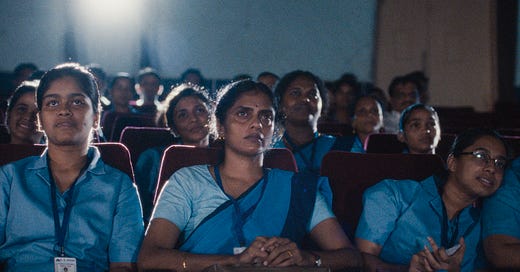Movie of the Week: ALL WE IMAGINE AS LIGHT (Payal Kapadia, 2024)
I’m baaaaack! Thank you for your patience as I script-supervised a feature and felt bad after a string of professional disappointments :')
A couple days before finally catching Payal Kapadia’s Cannes Grand Prix-winning narrative debut, I found myself searching for some Ethiopian piano music that I’d listened to years ago but had since lost track of. The world of recorded Ethiopian piano music is rather small, so it wasn’t long before I found the album: Éthiopiques, Vol. 21: Piano Solo, by renowned composer (and nun!) Emahoy Tsege Mariam Gebru. So you can imagine my surprise when All We Imagine as Light opened with an acknowledgement to … Sister Emahoy Tsege Mariam Gebru, thanking her for the permission to use her music in a film that didn’t fully adhere to her Christian values. Not a frame of Kapadia’s film had entered my retinas before I had this strangely coincidental connection with it. It’s remarkable, then, that the experience that followed was one I connected deeply with for other, more substantial reasons. The gently simmering narrative follows Mumbai nurses Prabha (Kani Kusruti) and Anu (Divya Prabha) as they navigate work, romance, and loneliness in the city as Malayalam-speaking transplants. Prabha’s long-estranged husband and the advances of a kindly doctor at work are the sources of her troubles; Anu’s secret, sexually active romance with a Muslim boy the source of hers. While All We Imagine is on the surface a story about the interiority of modern Indian women, at a deeper level it’s a film about the mystery and wonder of nighttime. Ranabir Das’s luminous 1.66:1 photography features some of the best night work in recent memory, and between the film’s bluish look and its themes of urban drift I was reminded more than once of the work of Tsai Ming-liang. (That’s the highest compliment I can give.) Which brings me to a larger postulation about the movie: it’s arguably “non-Indian” in its form. Kapadia has a worldly sensibility — the aforementioned taste for Ethiopian piano music; a decidedly “International Arthouse” quality to her images — that she’s brought home to Mumbai. Some have had gripes with that as an act of calculation. But I think the result is almost unspeakably beautiful, and my favorite new release of 2024.
Currently in theaters. Streaming soon on the Criterion Channel.





